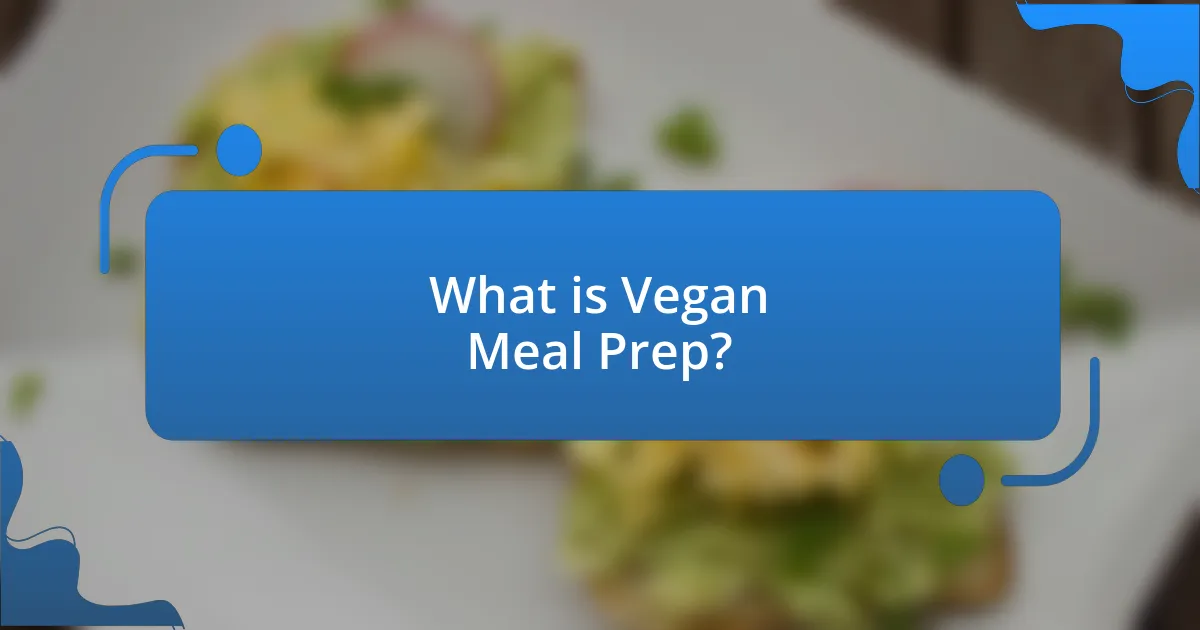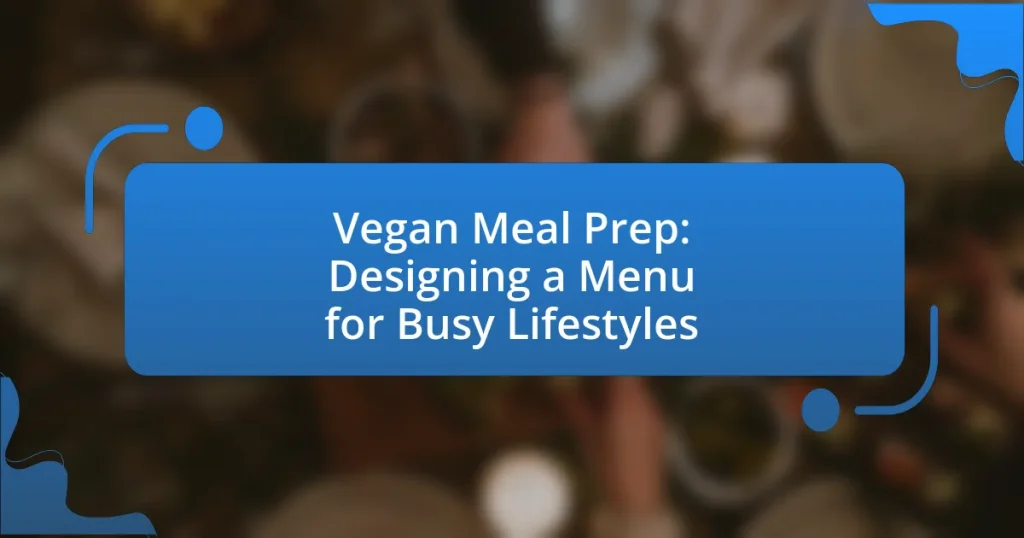Vegan meal prep is the strategic process of planning, preparing, and packaging plant-based meals in advance to enhance nutrition and save time, particularly beneficial for busy lifestyles. This article outlines the advantages of vegan meal prep, including its role in promoting healthier eating habits, reducing food waste, and saving money. Key principles such as planning, batch cooking, and ingredient versatility are discussed, along with practical tips for effective meal preparation. Additionally, the article addresses common challenges faced in vegan meal prep and offers insights into maintaining variety and nutritional balance in meal planning.

What is Vegan Meal Prep?
Vegan meal prep is the process of planning, preparing, and packaging plant-based meals in advance to save time and ensure a balanced diet. This method allows individuals to efficiently manage their nutrition by cooking in bulk, which can include chopping vegetables, cooking grains, and assembling meals that are stored for later consumption. Studies show that meal prepping can lead to healthier eating habits, as it reduces the likelihood of impulsive food choices and promotes portion control.
How does Vegan Meal Prep benefit busy lifestyles?
Vegan meal prep benefits busy lifestyles by providing convenient, nutritious meals that save time and reduce stress. By preparing meals in advance, individuals can ensure they have healthy options readily available, which helps avoid the temptation of unhealthy fast food or takeout. Studies show that meal prepping can lead to better dietary choices and improved overall health, as it allows for better control over ingredients and portion sizes. Additionally, meal prep can significantly decrease the time spent on daily cooking, allowing busy individuals to allocate their time to other important activities.
What are the key principles of Vegan Meal Prep?
The key principles of Vegan Meal Prep include planning, batch cooking, ingredient versatility, and proper storage. Planning involves creating a weekly menu that incorporates a variety of plant-based foods to ensure balanced nutrition. Batch cooking allows for the preparation of large quantities of meals at once, saving time and effort during the week. Ingredient versatility emphasizes using ingredients that can be utilized in multiple recipes, reducing waste and maximizing efficiency. Proper storage techniques, such as using airtight containers, help maintain freshness and prevent spoilage, ensuring that meals remain safe and nutritious for consumption. These principles collectively support a sustainable and efficient approach to vegan meal preparation.
How can Vegan Meal Prep save time and money?
Vegan meal prep can save time and money by allowing individuals to plan and prepare meals in advance, reducing the need for last-minute grocery shopping and takeout. By batch cooking and portioning meals, individuals can streamline their cooking process, which minimizes daily cooking time and reduces food waste. Studies show that meal prepping can lead to a 30% reduction in food costs, as buying ingredients in bulk and using them efficiently lowers overall expenses. Additionally, having pre-prepared meals on hand can prevent impulse purchases and reliance on expensive convenience foods, further contributing to savings.
Why is Vegan Meal Prep important for health?
Vegan meal prep is important for health because it promotes the consumption of nutrient-dense foods while reducing the intake of processed ingredients. By planning and preparing meals in advance, individuals can ensure they include a variety of fruits, vegetables, whole grains, and legumes, which are rich in vitamins, minerals, and fiber. Research indicates that a plant-based diet can lower the risk of chronic diseases such as heart disease, diabetes, and certain cancers, as evidenced by a study published in the Journal of the American Heart Association, which found that individuals adhering to a plant-based diet had a 32% lower risk of heart disease. Therefore, vegan meal prep not only supports a balanced diet but also contributes to long-term health benefits.
What nutritional benefits does a vegan diet provide?
A vegan diet provides numerous nutritional benefits, including higher intakes of dietary fiber, vitamins, and antioxidants while being lower in saturated fats. Research indicates that vegans typically consume more fruits, vegetables, whole grains, and legumes, which contribute to improved heart health and reduced risk of chronic diseases. For instance, a study published in the Journal of the American Heart Association found that plant-based diets are associated with a 25% lower risk of heart disease. Additionally, vegan diets are rich in essential nutrients such as magnesium, potassium, and folate, which support overall health and well-being.
How does meal prepping contribute to healthier eating habits?
Meal prepping contributes to healthier eating habits by promoting portion control and reducing the likelihood of impulsive food choices. When individuals prepare meals in advance, they can ensure that their meals are balanced and aligned with nutritional goals, such as incorporating a variety of vegetables, whole grains, and plant-based proteins. Research indicates that meal prepping can lead to a 50% increase in the consumption of fruits and vegetables, as individuals are more likely to include these foods when they have ready-to-eat options available. Additionally, having meals pre-prepared minimizes the temptation to opt for unhealthy convenience foods, thereby supporting overall dietary quality and adherence to a vegan lifestyle.
What challenges do people face with Vegan Meal Prep?
People face several challenges with vegan meal prep, including limited ingredient variety, time constraints, and nutritional balance. Limited ingredient variety can lead to repetitive meals, making it difficult to maintain interest in a vegan diet. Time constraints often hinder individuals from dedicating sufficient time to meal planning and preparation, which is essential for a successful vegan meal prep routine. Additionally, ensuring nutritional balance can be challenging, as individuals must be mindful of obtaining adequate protein, vitamins, and minerals from plant-based sources. These challenges can discourage individuals from fully committing to vegan meal prep, impacting their overall dietary adherence.
How can time constraints affect meal preparation?
Time constraints can significantly limit the options and quality of meal preparation. When individuals face tight schedules, they often resort to quick, less nutritious meals or pre-packaged foods, which may lack essential nutrients. Research indicates that busy lifestyles lead to a reliance on convenience foods, which are typically higher in calories, sugars, and unhealthy fats, negatively impacting overall health. A study published in the Journal of Nutrition Education and Behavior found that individuals with limited time for meal prep are less likely to consume fruits and vegetables, further compromising their dietary quality.
What common misconceptions exist about vegan diets?
Common misconceptions about vegan diets include the belief that they lack sufficient protein, are nutritionally inadequate, and are overly restrictive. Many people assume that vegans cannot get enough protein without animal products; however, numerous plant-based sources such as lentils, chickpeas, quinoa, and tofu provide ample protein. Additionally, some believe that vegan diets are deficient in essential nutrients like iron, calcium, and vitamin B12. In reality, with proper planning, vegans can obtain these nutrients from fortified foods and supplements. Lastly, the notion that vegan diets are too restrictive overlooks the vast variety of foods available, including fruits, vegetables, grains, nuts, and seeds, which can create diverse and satisfying meals.
How can one effectively plan a vegan meal prep menu?
To effectively plan a vegan meal prep menu, one should start by selecting a variety of nutrient-dense ingredients that provide balanced meals throughout the week. This includes choosing whole grains, legumes, vegetables, fruits, nuts, and seeds to ensure a diverse intake of vitamins and minerals.
Next, create a weekly menu that incorporates these ingredients into different meals, such as salads, stir-fries, and grain bowls, while considering batch cooking techniques to save time. For instance, cooking large portions of quinoa or lentils can serve as a base for multiple dishes.
Additionally, utilizing meal prep containers can help in organizing and storing meals efficiently, making it easier to grab and go during busy days. Research indicates that meal prepping can lead to healthier eating habits and reduced food waste, as it encourages planning and portion control.
What are the essential components of a vegan meal prep menu?
The essential components of a vegan meal prep menu include a variety of whole grains, legumes, vegetables, fruits, nuts, and seeds. Whole grains such as quinoa, brown rice, and oats provide essential carbohydrates and fiber. Legumes like lentils, chickpeas, and black beans are rich in protein and nutrients. A diverse selection of vegetables, including leafy greens, cruciferous vegetables, and colorful peppers, ensures a range of vitamins and minerals. Fruits add natural sweetness and antioxidants, while nuts and seeds contribute healthy fats and additional protein. This balanced combination supports nutritional needs and promotes overall health in a vegan diet.
What types of meals should be included in a vegan meal prep plan?
A vegan meal prep plan should include a variety of meals such as grain bowls, salads, soups, stir-fries, and snacks. Grain bowls can consist of quinoa or brown rice topped with vegetables and legumes, providing essential nutrients and protein. Salads should incorporate leafy greens, beans, nuts, and seeds for a balanced meal. Soups can be made with lentils or chickpeas, offering warmth and comfort while being nutrient-dense. Stir-fries can feature a mix of seasonal vegetables and tofu or tempeh, ensuring a quick and satisfying option. Snacks like hummus with veggies or energy balls made from dates and nuts can help maintain energy levels throughout the day. These meal types ensure a well-rounded vegan diet that is convenient for busy lifestyles.
How can variety be maintained in a vegan meal prep menu?
Variety in a vegan meal prep menu can be maintained by incorporating diverse ingredients, cooking methods, and flavor profiles. Utilizing a wide range of vegetables, legumes, grains, nuts, and seeds ensures nutritional balance and prevents monotony. For example, rotating between quinoa, brown rice, and farro as base grains can introduce different textures and tastes. Additionally, employing various cooking techniques such as roasting, steaming, and stir-frying can enhance the appeal of the meals. Flavor can be diversified through the use of global spices and herbs, allowing for dishes inspired by different cuisines, such as Indian, Mediterranean, or Asian. This approach not only keeps meals interesting but also supports a well-rounded diet, as different foods provide unique nutrients essential for health.
What tools and resources are helpful for Vegan Meal Prep?
Helpful tools and resources for vegan meal prep include meal planning apps, food storage containers, and kitchen appliances like blenders and food processors. Meal planning apps such as Mealime and Paprika assist in organizing recipes and shopping lists, streamlining the preparation process. High-quality food storage containers, particularly those that are airtight and microwave-safe, help maintain the freshness of prepped meals. Additionally, blenders and food processors facilitate the creation of smoothies, sauces, and dips, making it easier to incorporate a variety of plant-based ingredients into meals. These tools collectively enhance efficiency and organization in vegan meal preparation.
What kitchen tools are essential for effective meal prepping?
Essential kitchen tools for effective meal prepping include a sharp chef’s knife, cutting board, food storage containers, measuring cups and spoons, and a blender. A sharp chef’s knife allows for efficient chopping and slicing, while a sturdy cutting board provides a safe surface for food preparation. Food storage containers are crucial for keeping prepped meals fresh and organized, and measuring cups and spoons ensure accurate ingredient portions. A blender is useful for creating smoothies, sauces, and soups, enhancing the variety of meal options. These tools streamline the meal prepping process, making it easier to maintain a healthy vegan diet.
How can apps and websites assist in meal planning?
Apps and websites assist in meal planning by providing users with customizable meal options, grocery lists, and nutritional information tailored to specific dietary preferences, such as veganism. These digital tools allow users to input their dietary restrictions and preferences, generating meal plans that fit their needs. For instance, platforms like Mealime and Yummly offer recipe suggestions based on user-selected ingredients and dietary goals, streamlining the meal preparation process. Additionally, studies indicate that using meal planning apps can lead to healthier eating habits and reduced food waste, as they help users organize their meals and shopping efficiently.
What are some practical tips for successful Vegan Meal Prep?
Successful vegan meal prep involves planning, organization, and efficient cooking techniques. Start by selecting a variety of recipes that include whole grains, legumes, vegetables, and healthy fats to ensure balanced nutrition. Batch cooking is essential; prepare large quantities of staples like quinoa, brown rice, or beans that can be used in multiple meals throughout the week.
Invest in quality storage containers to keep prepped meals fresh and easily accessible. Labeling containers with dates and meal contents helps track freshness and variety. Incorporating seasonal produce not only enhances flavor but also reduces costs, as seasonal fruits and vegetables are often cheaper and more nutritious.
Lastly, dedicate a specific day for meal prep, allowing for focused time to cook and assemble meals, which can streamline the process and make it more enjoyable. Research indicates that meal prepping can lead to healthier eating habits and reduced food waste, supporting the effectiveness of these strategies.


